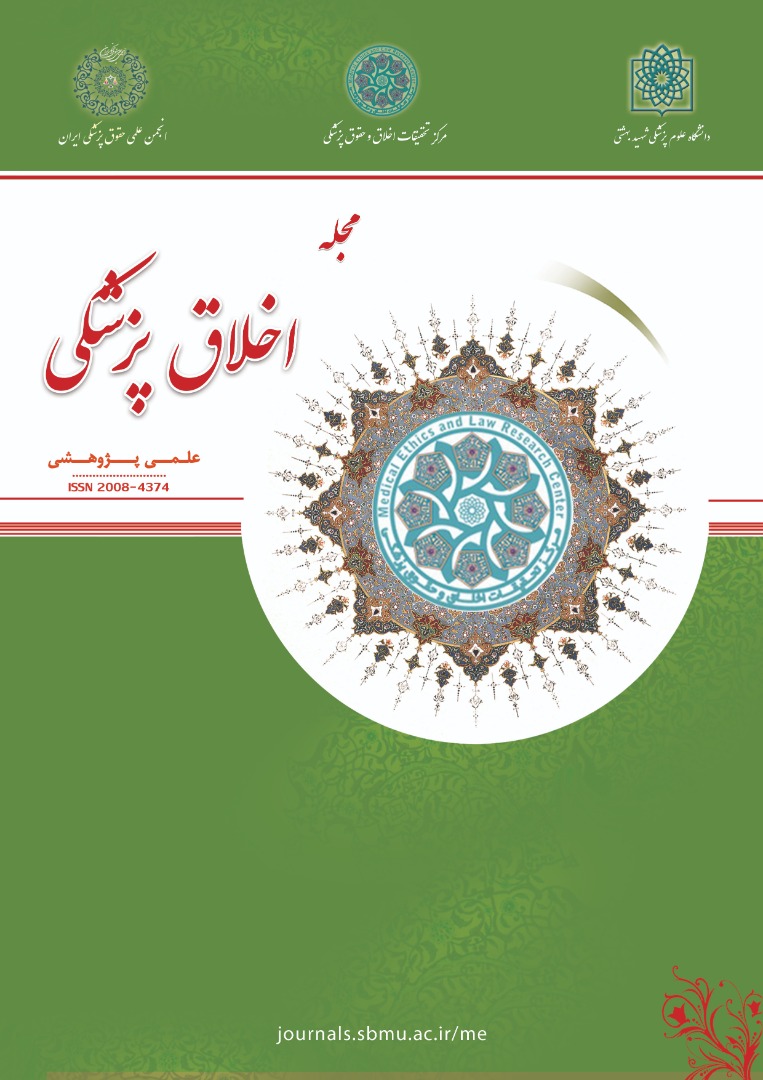نقش اخلاق حرفهای در پیامدهای فردی و سازمانی
مجله اخلاق پزشکی - علمی پژوهشی,
دوره 11 شماره 40 (1396),
17 تیر 2017
,
صفحه 53-62
https://doi.org/10.22037/mej.v11i40.17903
چکیده
زمینه و هدف: رعایت استانداردهای اخلاق حرفهای از سوی کارکنان دانشگاههای علوم پزشکی میتواند در کیفیت فرایند و برونداد سیستم دانشگاهی مؤثر واقع شود. مطالعه حاضر با هدف تعیین تأثیر اخلاق حرفهای بر پیامدهای فردی و سازمانی انجام شده است.
مواد و روشها: مطالعه حاضر یک مطالعه توصیفی ـ تحلیلی و مبتنی بر مدلیابی معادلات ساختاری است که بر روی 290 نفر از کارکنان شاغل در دانشگاه علوم پزشکی شهر تبریز در سال تحصیلی 95-94 انجام شده است. نمونهگیری به روش تصادفی طبقهای نسبی انجام و برای جمعآوری اطلاعات از چهار پرسشنامه استاندارد اخلاق حرفهای، درگیری شغلی، ترک خدمت و تلاش افزاینده استفاده شد. برای تجزیه و تحلیل دادهها از روشهای تحلیل عاملی تأییدی و مدل معادلات ساختاری استفاده شد.
ملاحظات اخلاقی: رضایت شفاهی مشارکتکنندگان اخذ و درباره محرمانگی اطلاعات به شرکتکنندگان اطمینان خاطر داده شد.
یافتهها: نتایج مدلیابی معادلات ساختاری نشان داد که بین اخلاق حرفهای با درگیری شغلی و تلاش افزاینده (p<0/01 ،r=0/17 ،r=0/25) رابطه علی مثبت وجود دارد. همچنین بین اخلاق حرفهای با ترک خدمت (0/32-=r) رابطه علی منفی مشاهده شد. بین درگیری شغلی و تلاش افزاینده (0/28=r) رابطه علی مثبت و نیز بین درگیری شغلی و تلاش افزاینده با ترک خدمت (r=0/27 ،r=0/32) رابطه علی منفی وجود داشت.
نتیجهگیری: یافتهها حاکی از آن است که توجه به اخلاق حرفهای و ارتقای آن در بین کارکنان سازمان، باعث تعلق شغلی و درگیرشدن آنان با شغلشان و نیز تلاش افزاینده آنان میشود.
- اخلاق حرفهای؛ درگیری شغلی؛ تمایل به ترک خدمت؛ تلاش افزاینده
ارجاع به مقاله
مراجع
Bidokhti A, Mardani E. Relationship between mental health and professional ethics among nursing staff. Med Ethics J 2015; 9(31): 49-73. [Persian]
Ashoori J. The relationship of ethical argument, ethical behavior and health of nurses with their metacognitive ethics. Med Ethics J 2015; 9(34): 55-76. [Persian]
Hasani M, Abbasi Khaljiri S, Galavandi H. Perceived Human Resource Practices and Its Relation with Positive Attitudes toward Work & Organizational Ethics. J Ethics Sci Technol 2017; 11(4): 90-100. [Persian]
Svensson G, Wood G. Codes of ethics best practice in the Swedish public sector. J Pub Sec Manag 2004; 7(2): 178-195.
Cardy R, Selvarajan T. Assenssingehical behavior: the impact of outcomes on judgment bias. J Manag Psychol 2006; 21(1): 52-72.
Orme G, Ashton C. Ethics a foundation competency. Ind Commerc Train 2003; 35(5): 184-190.
Mirkamali M. Ethics and social responsibility in educational management. J Psycho Educ 2003; 201-221. [Persian]
Esmaeili A, Abbasi M. Excellence of organizational ethics in the realm of health system. Bioethics J 2012; 2(4): 11-38. [Persian]
Karamdokht R. Investigating the relationship between organizational ethics of managers and organizational efficiency of high schools in Babolsar. J Educ Lead Admin 2011; 5(1): 115-126. [Persian]
Imanipoor M. Principals of professional ethics in education. Iran J Med Ethics Hist Med 2012; 5(6): 25-38. [Persian]
Araste H, Jahed H. Observing Ethics in Universities and Higher Education Centers: An alternative for improving behaviors. Sci Cultiv J 2011; 1(2): 31-40. [Persian]
Beikzad J, Sadeghi M, Ebrahimpoor D. The effect of organizational factors on the growth of professional ethics of employees. J Ethics Sci Technol 2012; 7(2): 1-9. [Persian]
Yaghinloo M, Javaherdashti F, Khalili Aragi M. Codes of professional ethics from formulation to practice. Tadbir J 2003; 135: 80-88. [Persian]
Saks AM. Antecedents and consequences of employee engagement. J Manage Psychol 2006; 21(7): 600-619.
Raymond T, Mjoli TQ. The relationship between job involvements, job satisfaction and organizational commitment among lower level employees at a motor-car manufacturing company in Eastern London, South Africa. J Bus Econ Manag 2013; 6: 25-35.
Elankumaran S. Personality organizational climate and job involvement; an empirical study. J Hum Val 2004; 10(2): 25-31.
Harter JK, Schmidt FL, Hayes TL. Business-unit-level relationship between employee satisfaction, employee engagement and business outcomes: A meta-analysis. J Appl Psychol 2002; 87(2): 268-279.
Lockwood NR. Leveraging employee engagement for a competitive advantage. Alexandria, VA: SHRM foundation; 2007. Available at: https://pdfs.semanticscholar.org/acc4/4ab3d4cb3c648cb2993fe705129984440ffe.pdf
Kahn W. Psychological conditions of personal engagement and disengagement at work. Acad Manage J 1990; 33(4): 692-724.
Tanaomi M. Intent to quit job and exercising job quit. Management Knowledge J 1993; 21: 50-55. [Persian]
Lloyd R. Discretionary effort and the performance domain. Aust N Z J Org Psychol J 2008; 1: 22-34.
Kanungo RN. Measurement of job and work involvement. J Appl Psychol 1982; 67(3): 341-349.
Mirhashemi M. Predictors of Job Involvement among Faculty Members of Islamic Azad University. Develop Psycchol J 2008; 4(15): 235-245. [Persian]
Colarelli SM. Methods of communication and mediating processes in realistic job previews. J Appl Psychol 1984; 69(4): 633-642.
Gregory CP, Hill RB. Are men and women different? A study of the occupational work ethic. J Vocat Educ Res 1994; 19(1): 71-89.
Ardalan M, Eskandari A, Gilani M, Ataei N. Investigating the relationship between character features and organizational intelligence of employees with managing intellectual capital. J Res Plan High Educ 2015. 71: 123-148. [Persian]
Rahimnia F, Nikkhah Z. The effect of ethical organizational climate on organizational identity and intent to quit of salespeople. J Ethics Sci Technol J 2011; 6(4): 1-11. [Persian]
.Nikkhah-Farkhani Z, Armoun Z, Javidnia M. The impact of ethical climate on turnover intentions and organizational performance. Manag Sci Letter 2013; 3(6): 1575-1582.
Taheri Demne M, Zanjirchi M, Nejatian M. The role of work ethics in improving organizational citizenship behavior. J Ethics Sci Technol 2011; 6(2): 9. [Persian]
Baharifar A, Johari Kamel M, Ahmadi A. Ethical behavior and organizational citizenship behavior: The effect of ethical values, justice and organizational commitment. Res Man Organ Resour 2011; 1(1): 23-42. [Persian]
- چکیده مشاهده شده: 1521 بار
